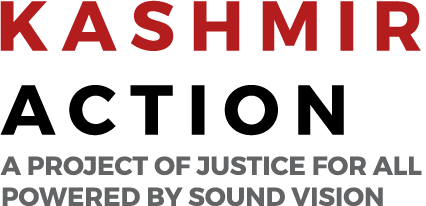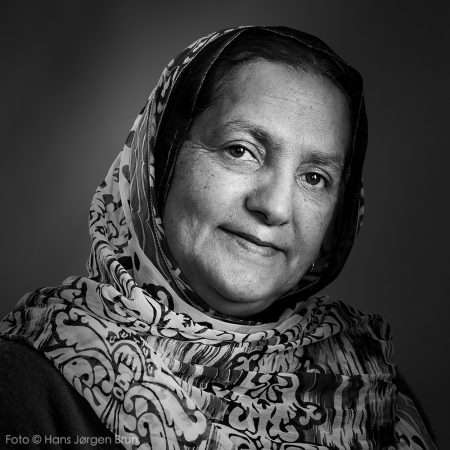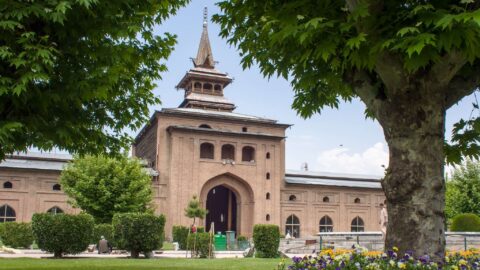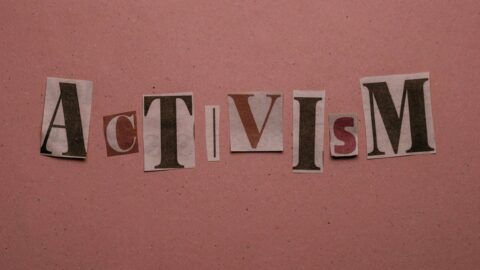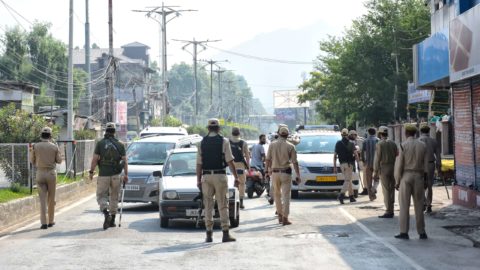The passage of India’s new Waqf Act has spotlighted the growing vulnerability of Muslim religious…
Echoes of the Lost: Kashmiri Women Who Wait
By Ather Zia
I want to talk about a photograph. I am a journalist.
Often journalists do not go too deep into a story. But I do, because I did not choose journalism, it chose me. I need to.
The story is of a photograph and of a man in it. Sigh. Yes, a man.
The photo is printed on a banner. The man is in his mid-twenties. At the threshold of his life, in love, with his beloved, with his homeland. A barely colored photograph. It is from the late 80s. The man would now have been around 40. About my age. His face is on the right side of the banner, jostling in the crowd of faces all of whom were forcibly disappeared by the soldiers and state agencies. There are only a handful of photos on the banner, but many have ‘been’ disappeared, in thousands.
The visages are pixelated to the nth degree. The man’s profile is almost a blur, and it is no surprise that the photo can be mistaken for anyone with a close resemblance, and it did happen.
The man was poor. Living in a homeland colonized by a relatively young nation-state, which itself was rising from the ashes of colonialism.
Not that I have heard this; the day he met his beloved for the first time it was at a cobbler’s. She was getting a sequin that had fallen off her red heels sewn back, and he was hoping to fix the only pair of good shoes he owned. He said he needed them to get ready for a job interview. They chatted as he picked up a pen that fell from her purse. He asked her out of the blue if she was a journalist. She said no. He said they needed journalists.
The man in the photo is a Muslim and bearded. Double whammy.
His story is also about the women who loved him and still do.
Did I get you? I think I did, I swear. When I said women, didn’t you think multiple wives and all in Burka? Aren’t Muslim men notorious for all that, being oppressive, polygamous, and violent maniacs, right? Ok, OK, I know I know — not the point here—story time.
There are several women in this tale—a mother, a wife, and someone else. The women are unrelated but claim the photo is of their person. They have long lost any photos or memorabilia they had in the raids by the soldiers. This photo is precious to them. Both know the other thinks it’s theirs. They don’t dispute each other, they are too tired for that, but each has their own story for the man in the photo.
The banner becomes a makeshift shrine when the Organization for the Forcibly Disappeared Persons or OFDP as it is called, does its monthly protest. Women will touch the banner, mourn, and pray; trying to look for the faces of their beloveds. The protests hardly happen. They are banned. The banner now hangs in the OFDP office which for the most part is shut down in fear of army raids. Times have become tougher. Even mourning is banned.
I have met these women and sat with them. I had tea with them. They shared their paracetamols when I had splitting headaches. One made me a turmeric and milk poultice when my right hand broke and I could not write for weeks. I have slept in their homes and used their prayer mats. We shared auto-rides while going to shrines praying the men return safely, but they haven’t.
“I ate a lot of dandelion greens throughout my pregnancy. Nothing else was available. I would go out foraging and bring back Hand, Kretch, Obij, and gucchi. You see, we lived in the mountains near a brook that ran through our house and our farm was close by. We were well-to-do. That was before the soldiers set up a camp next to us and we were displaced. We lost our family home and fields, cattle, everything.
My husband had to move to the city to find a job, and I was left by myself with my old father and mother. The last I saw of my husband was when he returned after our son was born. He got so many lovely clothes for us. And toys. It was funny. He got our newborn a cycle. Who gets a cycle for a newborn? I almost choked with laughter when I saw it. He said he wanted him to start walking sooner so that he could teach him to ride a bike. But he never could. Instead, we got his dead body. My husband was killed in custody; the doctor counted 23 bullets pumped into his chest which I brought home, but even those the army took, saying it was evidence of us having ammunition.
My husband was returning home when the soldiers ordered him and other men to get down from the bus. They were taken into the woods for identification and were left for dead after being badly beaten. Third-degree torture. By the time they allowed him to be taken to the hospital, he was dead.
Our boy had just turned one and started to walk. I could never bring myself to teach him to bike. He taught himself. He was a good lad. He studied hard. He would teach local kids to earn some money to help me. I worked on people’s farms and did embroidery work to make ends meet. Alhamdulillah, I was grateful to Allah. I looked forward to getting my boy a bride. As lovely as he was. He wanted to be a doctor. I did not know how he thought about it. I would have been happy had he said he wanted to work on a farm, become a tailor, play flute all day, or do nothing. He was the very air I breathed. I just wanted to see him, to be around me. Thrive. Smile. He has the most beautiful smile. His teeth were as white as a rich boy. I always told him he was destined for greatness. But when I got very sick, we needed money. He took up odd jobs but kept going to college. He said if he studied English, he could get a job teaching it. Everyone wants to learn English. He began practicing by teaching me. I loved his speaking like an Angrez Sahab. I had left school in 7th grade, but he loved to teach me, and I loved learning English words from him. We would laugh that one day we would both speak like saab and mem sab. He would jokingly say ‘Bye Mom’ lifting his hand like a hero, waving to me, when he left home, just like rich kids do. I was happy to see him look for happiness instead of sadness in our life.
He got a small notebook and asked me to write words in it. He would make fun of the way I wrote the English words. He said they looked like Kashmiri kids dressed in Angrezi clothes. I began to love our learning time together. I wrote words in the notebook all on my own. I still remember them till today and it breaks my heart. Why did I even learn English? Why did I even write anything? I curse myself for it. But what could I know?
One winter morning the soldiers cordoned off our village. They took all the men including my son into the forest and began searching homes for militants and arms. Now I am an old woman, but still, I fear letting soldiers into my home. You cannot be in a crowd with them and being alone with these lecherous brutes is pure terror. I was nervous. They were walking in with mud-covered boots and were ransacking the house. One of them began reading my little notebook. He asked me about the words, saying they were code words. He did not believe that my son was teaching me English. How can an ignorant woman like you write English he said. They were making a fuss over the words I had tried to memorize and were written on the first page. The other soldiers joined in checking the notebook as if they had found evidence of a big conspiracy.
I told them they were just words from my life: “Farm, hill, stream, military camp, walk, bus, bike, 23, bullets, kill, smile.” They accused my son of planning an attack on the military camp. They refused to listen, or they just wanted an excuse. They even said my husband had been killed because he was a fighter who had attacked the soldiers. They turned the story upside down. They arrested my son. Our neighbors had pleaded with the army officer saying my son was a student, but they took him. That day the TV said the army had caught a militant who was planning to attack the army camp to take revenge for his father’s killing. All I could do was to listen and cry. My last memory of my son is that morning when he left for the crackdown. He tried to make me smile, I think one last time by waving and saying, ‘Bye Mom.’ I have spent two decades looking for him. I do not know whether he is in jail or killed.”
The wife, when I interviewed her, pointed to the photo her memories gurgling to the surface, her face bright with tears:
“We were 19 when we got married. We were high school sweethearts. I dreamed of being his wife. Our wedding was a grand event. My husband had a beautiful heart. He called me ten times a day, checking on me, calling me his Zuv. When our four daughters were born, his funny software engineer side nicknamed them Zuv 1, Zuv 2, Zuv 3 & Zuv 4. He would always tell them that I was his original version of Zuv, his operating system. In our ten years together, I do not remember ever being angry at each other. If I made a mistake, he was patient, and if he made a mistake, I forgave him. I think it was too good to be true. Sometimes I did not believe my luck, and now I don’t.
In those days there were many encounters with the militants. A lot of crackdowns by the military. Curfews would last for months. The kids would grow restless inside. Our home was small, and we did not have a big yard. It was my dream to have a big yard where they could play freely. My husband was working hard for us to buy a suitable property. I was also doing a job in a private school as a teacher earning a modest salary. We dreamed of a better future for children despite the violence that surrounded us.
My husband wanted our children to study the Quran Shareef. He hired one of his old friends who had become a Maulvi to teach our girls at home. Maulvi Sab was a good man. He patiently taught our daughters for two years before he was arrested on suspicion of having links with the resistance. Such was his respect for me, that never in his two years of visiting my house did he lift his gaze to look at me. I am sure if he saw me on the road, he wouldn’t know who I was. Such haya, such tehzeeb. Soon after his arrest, my husband was picked up by the military. They detained him several times asking about his friendship with Maulvi Sab. He would tell them they are good friends. My husband had a great love for resistance. He would say he was proud of his friend. Soon it became a pattern. He was often summoned and detained for weeks, and then for months. Our house was raided often. All his computer stuff was taken away. I was detained several times; and interrogated about what I knew about my husband’s link with the resistance.
It soon became clear that the police and army were cooking up a case framing my husband and Maulvi Sab as overground workers of resistance. I tried to appeal in court and make some noise in the media, but I was also arrested and jailed. The headline about us was that a “terrorist couple” had been caught. I was jailed for 5 years. During that time my house had been taken away by the government and all our possessions were gone. My daughters had to live with different relatives for short periods because no one could take care of them permanently. My husband was sent to prison outside the state, but we lost track. His whereabouts till this day are unknown. I am sure he was never taken outside. I received a cryptic message from a prisoner. He had heard my husband’s cries ringing across the jail for many nights while he was being tortured. Then they suddenly stopped. He was not released, what had happened? Was he killed? We don’t know. All we know is that the police said he was sent to jail outside the state; but how could they do it without his appearance at the court and formal orders? All I know is that it is close to three decades since they disappeared him!”
He loved poetry and freedom. He said poetry is freedom because in a poem, “you can travel anywhere, you can choose to unsee soldiers, borders, and bunkers.” Not only am I colonized I am also dirt poor, so the vehicle of poetry is all I have, he joked. Poetry to the man was like a forgiving mother but also an exacting father because it required sitting down and writing. Which he did not like and would often ask her to hone her writing skills. But she was not a poet. While he read Agha Shahid Ali’s searing poems that told of the tragedy of their homeland, he teased her with a John Donne poem called ‘The Flea.’ In that poem, the poet talks about the blood of the poet and his beloved mixing inside the insect’s belly or so I recall. Whenever the man saw a mosquito, he would ask her to sit still so that it would bite them both. He said it was as close as they could get to mixing their blood, calling the mosquito their little bloodthirsty child.
The girl’s family made it difficult for them to think of a future together. She was forced to leave and study journalism elsewhere. The boy continued his life as a teacher in a small school. Years later when the girl returned the boy had been disappeared by the military. Arrested one evening while returning home and never being seen after. His parents had died too, and someone else lived in their family home. The girl had a passport-size photograph in her possession. She wanted him to exist outside her heart as well. That small passport-sized picture of him was all she had, and she offered it for the banner. She never claimed it openly as hers.
How do I know this? Don’t ask, as I said before journalism chose me.
